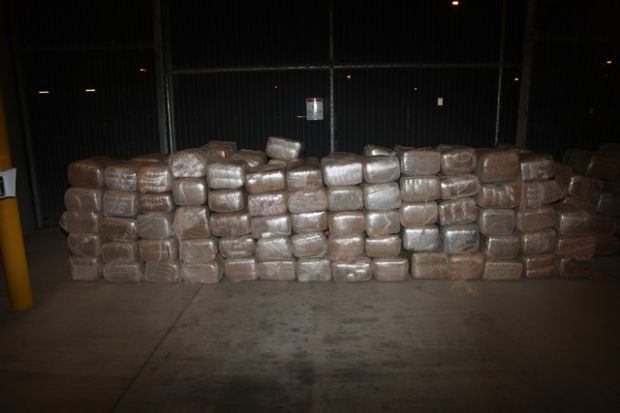They hid loads of pot and cocaine in cars, pickups and semis.
They carried heroin in a suitcase.
Now they’re out of prison early, 11 among thousands of prisoners being released after the U.S. Sentencing Commission reduced prison terms for those convicted of federal drug-trafficking crimes during a 24-year period.
Among prisoners sentenced in Arizona, 47 have been released since Nov. 1, assistant federal public defender Keith Hilzendeger told me. Eleven of those were sentenced at Tucson’s federal court.
With one exception, their cases tell unfortunately common stories of smuggling in Southern Arizona. Hector Martinez-Mendez, for example, drove a Chevy Silverado into the port of entry at Nogales on Sept. 15, 2011. Inspectors found 7.1 kilograms of cocaine hidden inside.
Sentenced originally to five years in prison, the early release sent him out of prison about two months and three weeks early. A citizen of Mexico, rather than being released he was to be deported, though available court records don’t confirm that happened.
Is this a good thing? If it’s done carefully, it probably is.
The releases are a calculated risk prompted by a decision of the U.S. Sentencing Commission in 2014. Sentences in the federal courts are calculated on a point system. The commission simply reduced by two points the sentences of people convicted of drug trafficking offenses over a 24-year period and applied the reduction retroactively.
Congress could have stepped in and stopped the reduction but didn’t. Around 46,000 offenders are eligible, the commission estimates. So far in Arizona, the releases have been a deliberate process, and Hilzendeger has been one of the leaders.
“For a district that has as many drug trafficking convictions as we have, few have been given relief,” he said.
Federal prosecutors and defense attorneys have been reviewing cases, considering the dangerousness of the inmates and their prison records, then calculating reduced sentences, and sending the recommendations on to federal judges. So far the judges have rubber-stamped these agreements.
The releases began last weekend. Eight of Tucson’s 11 made court motions for reduced sentences themselves, but three were lucky enough to have the attorneys notice their cases and find that they were qualified for early releases.
For one prisoner, Damien Anton Martinez, the reduction was almost negligibly small. A U.S. citizen, he was caught driving 469 pounds of pot near Douglas in February 2010: The package near the exhaust pipe heated up and started smoking, leading to the traffic stop, court records say. Martinez got out just six days early.
Then there is Richard Moreno — the compelling exception to the rule. Moreno’s case was prominent enough that the Star published stories about it after his arrest in 1992. He helped load a tractor-trailer with 1,760 pounds of cocaine and served as a translator among the co-conspirators who moved more than 3,000 pounds to California, court records say.
Co-defendants pleaded guilty, testified at trial and got out of prison years ago. Moreno went to trial in 1993 and was sentenced to 30 years in prison. That was the minimum: He could have gotten life.
The people evaluating Moreno’s motion for a reduced sentence asked Assistant U.S. Attorney Jesse Figueroa, a longtime local prosecutor who originally oversaw the case, what Moreno’s role was. He said Moreno “was not a leader or organizer of the overall conspiracy in this case,” according to the court filing asking for his reduced sentence.
Imagine that: a guy who was a worker bee in a cocaine smuggling operation got 30 years in prison. This is the sort of person these reductions were designed for, it seems. Now 63, he was released to a halfway house in California three years and five months before his projected release date in March 2019.
In his motion asking for a reduced sentence, Moreno, who was 41 when he entered prison, described himself as a “model inmate” who has changed for the better.
“I would like to spend time with my daughters and their children during these last few years of my life,” he said.
Not everyone is convinced these releases are a good idea. I spoke Friday with Steven Cook, who heads a federal-prosecutors’ group called the National Association of Assistant U.S. Attorneys.
“Some of the people released on early release provisions from the sentencing commission have committed some serious crimes,” he said.
Cook opposes this recent reduction by the U.S. Sentencing Commission as well as two earlier ones that dealt with people convicted of crack cocaine offenses. Longer sentences are one of the reasons crime rates have been going down for two decades, he said, because they mean criminals are not out committing crimes.
But if the 11 released from Tucson cases are a sign of what’s to come, I’m not too worried about a crime wave from released drug traffickers.
First, nine out of the 11 are getting out less than five months early, so the reductions aren’t drastic. Second, seven of the 11 are foreign citizens, six from Mexico and one from Honduras, who will be deported. Yes, they might smuggle again, but they weren’t considered dangerous to begin with.
And finally, no matter how many people we’ve arrested for smuggling drugs across the border or carrying them across the country, we’ve never run out of traffickers, so locking them up has not reduced the flow of contraband.
As long as they’re carefully filtering out dangerous offenders, the program should be an overall benefit.





